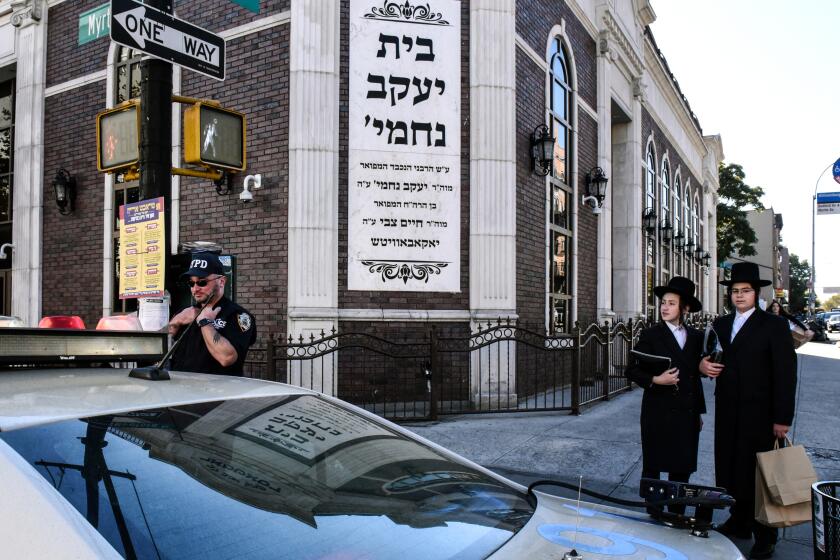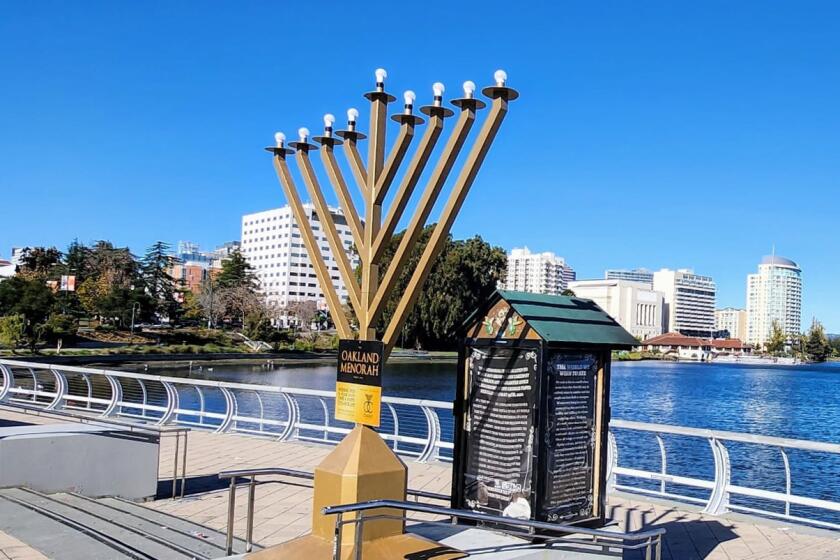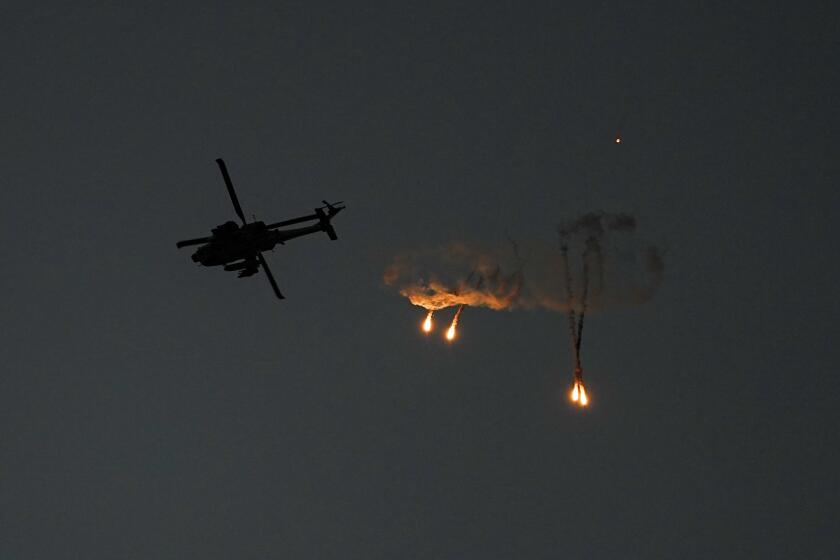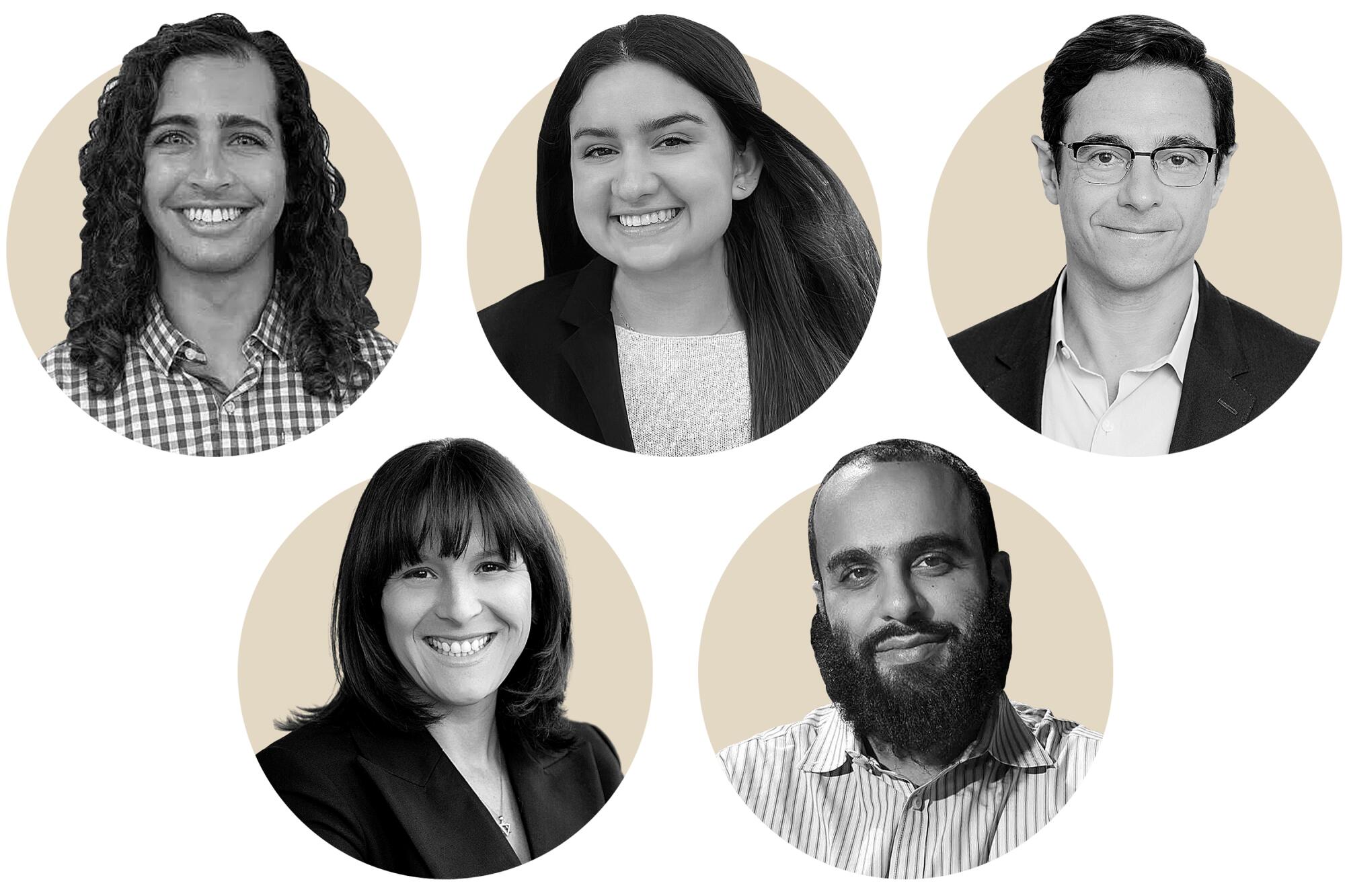
- Share via
Someone scrawls “Free Gaza” under a mural on a Jewish deli. Demonstrators rally outside an Israeli-owned restaurant in Philadelphia. A Hanukkah candle-lighting at a community event in Virginia is not allowed unless the rabbi agrees to call for a cease-fire.
Are these instances of antisemitism? Or are these appropriate expressions of political opinion against the Israel-Hamas war?
To answer these questions, The Times gathered a panel of Jewish thinkers to talk about recent incidents and help define what antisemitism is and what antisemitism isn’t. At times, there was agreement; at times, discord. Each offered a unique perspective on the experience of being Jewish in America.
This conversation, moderated by Times senior editor David Lauter, has been edited and organized for clarity and brevity.
What is antisemitism? And who gets to decide?
Dov Waxman: Fundamentally, antisemitism is anti-Jewish racism. It’s distinct — it has its own history and different kinds of manifestations, but it is a form of racism. And when we think about racism, we recognize that racism isn’t just about prejudice or intent. It is also about the effects of actions.
Unfortunately, when it comes to antisemitism, many people still focus solely on the question of intent.
I do think we still have to pay attention to motives. But it’s important to recognize that sometimes intent may not matter, and what matters is impact.
Even before the Gaza war, antisemitism was on the rise. That has deeply unsettled many American Jews, accustomed to seeing the U.S. as a safe haven.
Serena Oberstein: If I’m driving down the street and I turn my head and I get into an accident but I didn’t mean to, I still got into an accident. Someone still may have gotten injured.
Laya Albert: Just as any other group typically is on the forefront of defining what they see as hate towards them, Jews should get to do that as well. It shouldn’t necessarily be an outsider who is choosing what we find offensive.
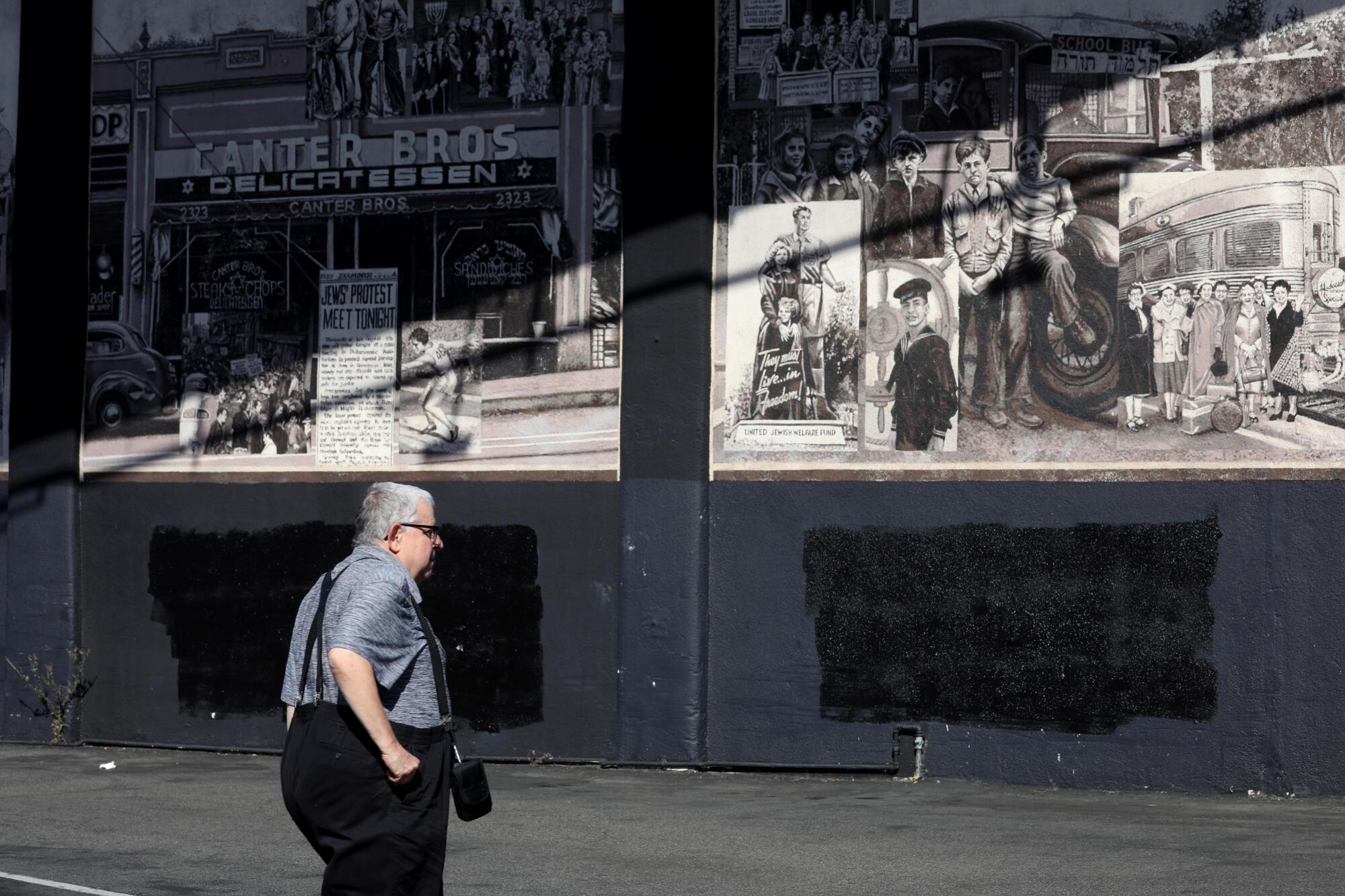
The graffiti on the deli
Graffiti saying “Free Gaza,” “How many dead in the name of greed?” and “Israels only religion is capitalism” was painted this fall on Canter’s Deli, a Jewish restaurant in Los Angeles’ historically Jewish Fairfax neighborhood, beneath a mural that showcases the history of L.A. Jews.
Albert: Vandalizing something because it’s a Jewish property, no matter what it says, is antisemitic.
Waxman: It’s the location, not the message. I mean, it’s a form of political speech. But the fact that it was graffitied on a Jewish deli is holding all Jews collectively responsible for the actions of Israel, which is antisemitic. On a different wall somewhere that’s not a Jewish institution or Jewishly identified in any way, that wouldn’t be antisemitic.
Elad Nehorai: It’s impossible to know people’s intent, but I feel like that one, it seems more likely the intent would be antisemitic.
The candle-lighting that wasn’t
A rabbi proposed to hold a Hanukkah candle-lighting at a community arts festival this month in Virginia. The festival organizer reportedly refused “unless we could get an Islamic group to participate at the same time,” then proposed an alternative: The candle-lighting could go forward if it included a call for a cease-fire in Gaza.
Oberstein: The intention behind the actions may not have been motivated by antisemitism. But saying that people don’t get to live who they are, and that just by being Jewish we are characterized as a monolithic group, it’s reductive. It’s antisemitic. Lighting a candle and talking about spreading light in the darkest times — there should be nothing political about that moment.
Albert: Hanukkah has been celebrated for 2,000 years. That’s well before what happened on Oct. 7. That’s well before Israel was even a state. So, telling Jewish people that they can’t celebrate Hanukkah is clearly antisemitic.
A vandal or vandals broke apart the large steel structure and three chunks of it into Lake Merritt.
Benjamin Kersten: I can understand why someone might have the assumption that a representative of the Jewish community is Zionist. That’s just sort of a fact of most Jewish institutions. That does not excuse the assumption, but I can sort of understand why that might come up, even though, as we agree, it’s problematic.
Waxman: If we were to replace Jews with another group and, say, tell Muslims that they can’t celebrate Eid in public without Jews being present and also celebrating, that would be Islamophobic, right? So, the same applies in this case to Jews.
The protest at the falafel restaurant
Protesters gathered outside a Philadelphia falafel restaurant this month and accused the Israeli-born owner of genocide. The owner reportedly has donated money from his restaurants to United Hatzalah, a nonprofit that offers emergency medical services in Israel and has provided supplies to the nation’s military.
Albert: Personally, I often see anti-Zionism as antisemitism. I know a lot won’t agree with that, but if you see it that way you’re going to be more inclined to see these chants as antisemitic.
Oberstein: I think it depends on what the chants were, right? If they’re chanting, “Intifada, revolution,” or “From the river to the sea” — which to me sounds like calling for the survival of one people at the expense of another people — that then can be read as antisemitic.
But I don’t think that standing in front of a building protesting and shouting is antisemitic.
Waxman: Most Jews support Israel, support Zionism. So the danger of these kinds of protests is even though they’re saying, “We’re targeting Zionists,” it ends up targeting Jews. It ends up leaving many Jews feeling afraid and vulnerable, even if that is not the intention.
At the very least, this is very unhelpful, just as it would be unhelpful and dangerous to start targeting Palestinian-owned businesses in the United States because a Palestinian business owner may be expressing support for the Palestinians. This is the danger of this conflict: globalizing in a way that’s going to lead not just Jews to feel more vulnerable, but also Palestinians and Muslims in general.
Across the Los Angeles area, home to the second-largest Jewish community in the United States, Jews are unsure how they want to celebrate Hanukkah as the bloodshed continues in the Middle East.
Nehorai: We’re having really big discussions about this example. It’s kind of on the edge, whereas there’s a ton of cases that are much more impactful, much more dangerous and have a lot more intent behind them.
People brought up examples of what if a Muslim institution was targeted in this way. It’s important to understand that actually, Muslim institutions are being targeted in a similar way and that they’re not getting the same attention.
It kind of highlights how this can be affected by bad-faith actors. Certain stories can be inflated because they’re about Israel specifically.
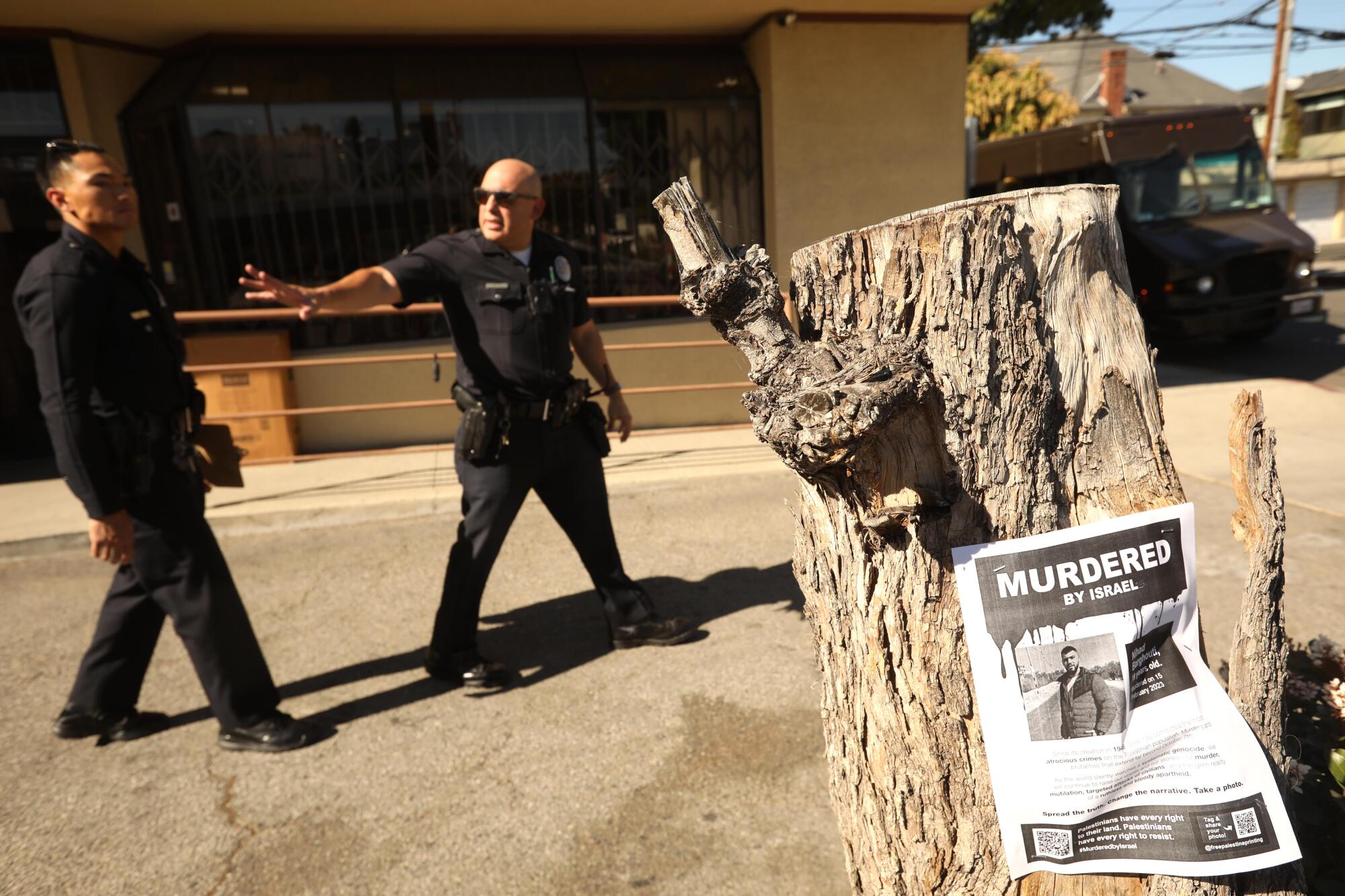
The fake blood outside the lobbyist’s home
Protesters gathered last month in front of the L.A. home of the president of the pro-Israel lobbying group American Israel Public Affairs Committee, known as AIPAC. Footage showed protesters igniting smoke devices in the street and spattering fake blood on the property.
Waxman: First of all, I don’t think it’s a good idea to be protesting outside people’s homes. But I don’t think that is antisemitic insofar as this person was targeted.
It was presumably on the basis of their involvement in AIPAC and the perception that AIPAC is crucial in terms of encouraging U.S. support for Israel and therefore U.S. support for the current war. AIPAC is not specifically Jewish. It’s a pro-Israel organization.
If people were accusing AIPAC of exercising some sort of manipulative control over all of U.S. foreign policy, that’s where you end up going into antisemitism because you’re then drawing on antisemitic conspiracy theories, which does happen when some people on the left attack AIPAC.
Nehorai: A president of AIPAC has enormous sway in the discussions around what is and is not antisemitic. Whether they should or they shouldn’t is another question, but they do. We can say whatever we want here, but ultimately, a lot of it’s going to end up warped once it goes out into these special interest groups.
Kersten: One question this also raises is around the types of criminalization that we’re talking about. I’m not always sure investigating something as a hate crime is the most helpful framework for discussing these things. There’s not much conclusive evidence that treating acts of violence as hate crime prevents bias-based harm.
A Times special correspondent in Gaza offers a personal account of living in a place where nowhere feels safe.
Do you feel safe as a Jew in America?
Waxman: It’s important to recognize in this moment how vulnerable and fearful many Jews feel. There’s really a deep, widespread sense of alarm over antisemitism in the U.S.
Oberstein: This moment feels compounded with a lot of other moments that have been happening. In August of 2017, when [the white supremacist rally in] Charlottesville happened, that felt like a rise of intolerance here in this country and also around the world.
This moment, Oct. 7, is like the fever pitch of that, right? Where we’re all in trigger mode all the time.
Nehorai: A lot of times when something happens in Israel, there’s still an idea of a separation between American Jewry and Israeli Jewry. One of the things that made this very different is that so many of us were in some sense connected to what happened. A good amount of my friends or people that I know know someone who was killed or taken hostage.
The war happened right after Oct. 7, so there was not a moment to mourn, and we immediately went into discussions about the war — for good reason.
I think the emotional insecurity that Jews are feeling is very real and is not being taken seriously. That’s making them feel even more alone.
Albert: I write for my school’s newspaper. I wrote an article — it wasn’t necessarily even a pro-Israel article. It was a lot more about the rise of antisemitism on my campus. A few days after that article, there was a sign on a lamppost near my dorm directly threatening me. And, of course, that made me feel unsafe.
I had to meet with the USC threat assessment team. I wasn’t allowed to go to class for two days. I had to do everything on Zoom.
I’m wearing my Jewish necklace for the first time in a month now that I’m home from college for winter break.
Kersten: I don’t want to dismiss anyone’s discomfort — that’s very real. I think there are a lot of ways that Jews have trauma responses built into their bodies, and I want to respect that.
I personally have not felt unsafe as a Jew on campus. The most unsafe I’ve felt is when I’m walking around and I have a black and white kaffiyeh, maybe I have a protest sign, or maybe I’m with a group of Jews under a cease-fire banner. Those are the times that I’ve been exposed to threats and intimidation unlike anything that I have experienced in my life before.
Albert: People chanting through my campus, “There’s only one solution: Intifada, revolution.” I’m just sitting on the grass, eating my lunch in peace, and I hear people calling for the killing of my friends in Israel, my family.
Nothing about that is going to make me feel safe.
Kersten: I’ve attended rallies where there are chants that I may not personally agree with. I can’t determine what everyone means when they say that chant or when they say “From the river to the sea.”
But as someone who has participated in rallies, when I say it, it is a call for collective liberation against what I understand to be an ongoing state policy of creating an ethnic state between the Jordan River and the Mediterranean Sea.
Waxman: One of the things we’ve seen in just our conversation is actually, on many issues — maybe not those concerning Israel and Zionism — most Jews do agree about what is antisemitic.
The fact is that the most dangerous form of antisemitism in the United States — the thing that’s actually led Jews to being killed in their places of worship — is on the far right and is white nationalism in particular. That is the great danger, and we don’t spend nearly as much time talking about that danger as we are debating whether the chants of some college students should be considered antisemitic.
More to Read
Sign up for Essential California
The most important California stories and recommendations in your inbox every morning.
You may occasionally receive promotional content from the Los Angeles Times.
